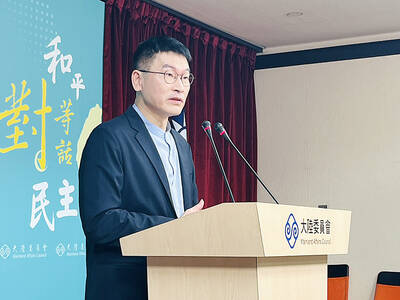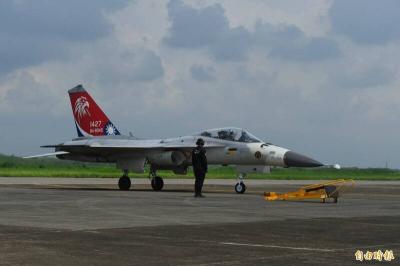The Ministry of Education yesterday said that Taiwanese students’ US visa applications are continuing as usual, after Politico reported that US President Donald Trump’s administration is considering requiring all international students to undergo social media vetting.
US Secretary of State Marco Rubio on Tuesday ordered US embassies to “pause scheduling new interviews for such student visa applicants,” Politico reported.
“Effective immediately, in preparation for an expansion of required social media screening and vetting, consular sections should not add any additional student or exchange visitor (F, M, and J) visa appointment capacity until further guidance is issued,” the order said, according to Politico.

Photo: Wang Yi-song, Taipei Times
Minister of Education Cheng Ying-yao (鄭英耀) yesterday at the Legislative Yuan said that the ministry’s overseas branches were in contact with Taiwanese students studying at Harvard University.
The ministry is also in talks with the American Institute in Taiwan (AIT) to ensure that Taiwanese students’ rights to study are not infringed, Cheng said.
The Department of Higher Education is working with National Taiwan University, National Tsing Hua University and National Yang Ming Chiao Tung University to offer students a smooth transfer to domestic universities, he added.
Department of Higher Education Director-General Liao Kao-hsien (廖高賢) said the department has received phone calls from Harvard students, but they did not mention being asked to leave the university.
Domestic universities have expressed a willingness to accept students in the US, Liao said.
Department of International and Cross-strait Education Director-General Lee Yu-jiuan (李毓娟) said the US Department of State’s Web site does not carry any information about a general halt on student visas.
Lee also said that her department had reached out to the AIT and confirmed that it had not received an order from the US Department of State to suspend student visa processing, and that all scheduled visa interviews were continuing as planned.

LOW RISK: Most nations do not extradite people accused of political crimes, and the UN says extradition can only happen if the act is a crime in both countries, an official said China yesterday issued wanted notices for two Taiwanese influencers, accusing them of committing “separatist acts” by criticizing Beijing, amid broadening concerns over China’s state-directed transnational repression. The Quanzhou Public Security Bureau in a notice posted online said police are offering a reward of up to 25,000 yuan (US$3,523) for information that could contribute to the investigation or apprehension of pro-Taiwanese independence YouTuber Wen Tzu-yu (溫子渝),who is known as Pa Chiung (八炯) online, and rapper Chen Po-yuan (陳柏源). Wen and Chen are suspected of spreading content that supported secession from China, slandered Chinese policies that benefit Taiwanese and discrimination against Chinese spouses of

PROMOTION: Travelers who want a free stopover must book their flights with designated travel agents, such as Lion Travel, Holiday Tours, Cola Tour and Life Tours Air Canada yesterday said it is offering Taiwanese travelers who are headed to North America free stopovers if they transit though airports in Japan and South Korea. The promotion was launched in response to a potential rise in demand for flights to North America in June and July next year, when the US, Canada and Mexico are scheduled to jointly host the FIFA World Cup, Air Canada said. Air Canada offers services to 13 of the 16 host cities of the tournament’s soccer games, including Toronto and Vancouver; Mexico City, Guadalajara and Monterrey in Mexico; Atlanta, Georgia; Boston; Dallas; Houston;

The US approved the possible sale to Taiwan of fighter jet spare and repair parts for US$330 million, the Pentagon said late yesterday, marking the first such potential transaction since US President Donald Trump took office in January. "The proposed sale will improve the recipient's capability to meet current and future threats by maintaining the operational readiness of the recipient's fleet of F-16, C-130," and other aircraft, the Pentagon said in a statement. Trump previously said that Chinese President Xi Jinping (習近平) has told him he would not invade Taiwan while the Republican leader is in office. The announcement of the possible arms

ALIGNED THINKING: Taiwan and Japan have a mutual interest in trade, culture and engineering, and can work together for stability, Cho Jung-tai said Taiwan and Japan are two like-minded countries willing to work together to form a “safety barrier” in the Indo-Pacific region, Premier Cho Jung-tai (卓榮泰) yesterday said at the opening ceremony of the 35th Taiwan-Japan Modern Engineering and Technology Symposium in Taipei. Taiwan and Japan are close geographically and closer emotionally, he added. Citing the overflowing of a barrier lake in the Mataian River (馬太鞍溪) in September, Cho said the submersible water level sensors given by Japan during the disaster helped Taiwan monitor the lake’s water levels more accurately. Japan also provided a lot of vaccines early in the outbreak of the COVID-19 pandemic,